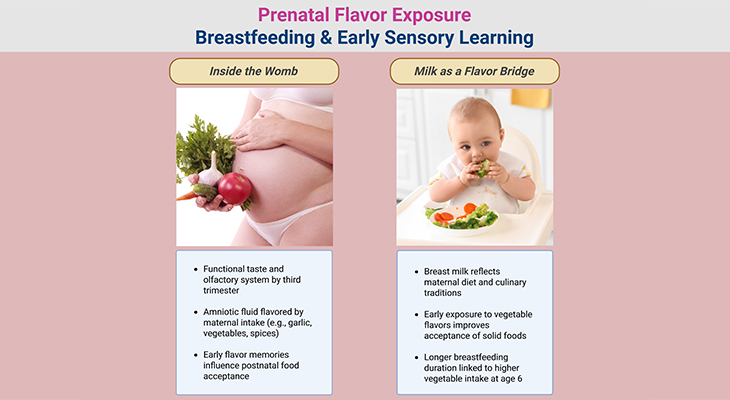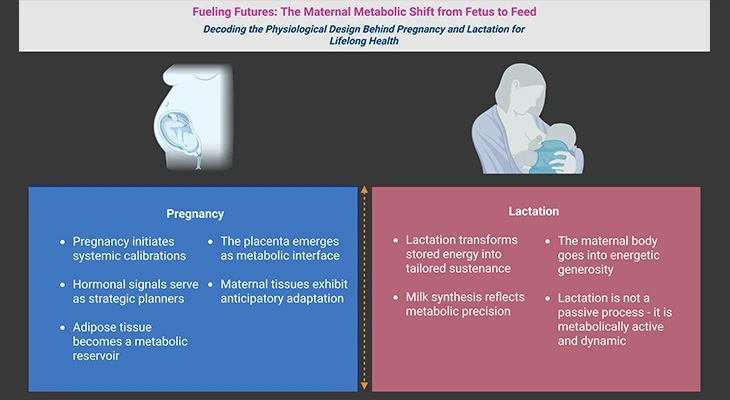Table of Contents
- Introduction
- Nourishing the Developing Mind—A Shared Frontier for Medicine and Motherhood
- Nourishing Young Minds: How Diet Shapes Executive Function in Childhood
- Bright Eyes, Sharp Minds: Lutein’s Pathway from Retina to Cognition
- Wired to Learn: Choline’s Critical Role in Childhood Brain Development
- Hydrate to Elevate: Unlocking Mental Flexibility Through Water
- Feeding the Mind: How Dietary Fiber Shapes Cognitive Development Across the Lifespan
- Final Reflections: Nutrition as a Cognitive Catalyst
- Take-Home Messages
- Summary and Conclusions
- Did You Know About Folate Receptor Autoantibodies (FRAAs) and Brain Development?
- References
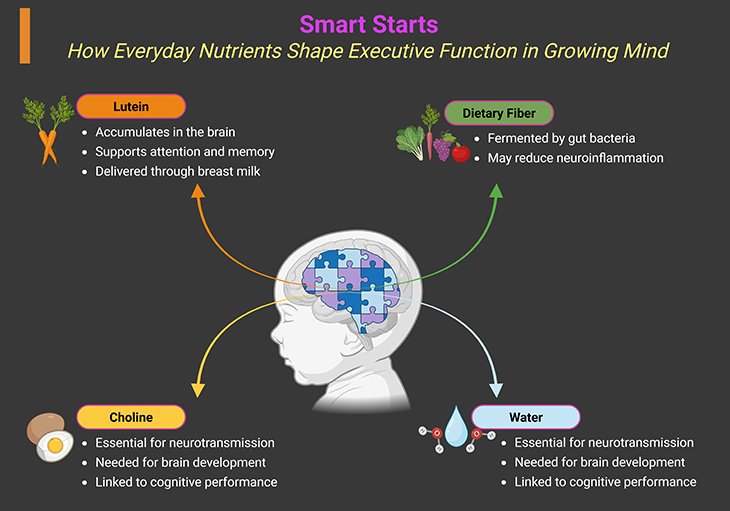
Figure 1. Smart Starts: Everyday Nutrients That Build Brains and Shape Futures. A visual guide to four foundational nutrients—lutein, choline, water, and dietary fiber—that support executive function in growing minds. Designed to inform caregivers, clinicians, and educators about the cognitive potential of nutrition across developmental stages, including children with diverse neurocognitive profiles. This infographic illustrates the role of four key dietary components—lutein, choline, water, and dietary fiber—in supporting executive function during childhood. Each nutrient is paired with its cognitive impact: (1) Lutein accumulates in the brain and retina, supporting attention and memory. (2) Choline contributes to neurotransmitter synthesis and myelination, enhancing processing speed and focus. (3) Water sustains cerebral blood flow and hydration, improving mental flexibility and working memory. (4) Dietary fiber modulates the gut microbiota, influencing neuroinflammation and inhibitory control. These nutrients are accessible through everyday foods and may offer cognitive benefits not only for typically developing children but also for those with executive function challenges, including children on the autism spectrum. While mechanisms are still being explored, emerging evidence suggests that nutritional modulation of neural and microbial pathways may support cognitive regulation across diverse developmental profiles.
Introduction
Nourishing the Developing Mind—A Shared Frontier for Medicine and Motherhood
Executive control—the mental toolkit that enables children to focus, adapt, and regulate behavior—is foundational to lifelong learning, emotional resilience, and social success. These cognitive functions, which include working memory, inhibitory control, and cognitive flexibility, are not fixed traits but dynamic capacities shaped by early-life experiences. Among these, nutrition stands as a powerful, modifiable influence—one that bridges the clinical realm and the everyday decisions made at the family table.
For clinicians, educators, and researchers, the search for scalable interventions to support cognitive development has never been more urgent. For expectant mothers and caregivers, the desire to nurture a child’s full potential begins long before the first word is spoken or the first step is taken. This article explores how specific nutrients—lutein, choline, water, and dietary fiber—may support the architecture and efficiency of executive control during childhood. These nutrients are not exotic or elusive; they are accessible, evidence-based, and deeply intertwined with habitual diet quality (see Figure 1) [1].
Importantly, the implications extend beyond typical development. Children with autism spectrum disorder (ASD) often experience challenges in executive function, including difficulties with attention regulation, cognitive flexibility, and impulse control. While autism is multifactorial and complex, emerging research suggests that nutritional modulation of neural and microbial pathways may offer supportive benefits. For example, choline’s role in myelination and neurotransmitter synthesis, lutein’s antioxidant properties in neural tissue, and fiber’s influence on the gut-brain axis may intersect with biological mechanisms relevant to ASD. Though this article does not claim to treat or cure autism, it highlights how nutritional strategies that support executive control may also benefit neurodiverse children, offering a hopeful avenue for inclusive cognitive support.
In a landscape where dietary guidelines for cognitive health in children remain conspicuously absent, this narrative review aims to illuminate the science, inspire clinical curiosity, and empower caregivers with actionable insights. Whether you are a physician advising families, a researcher designing interventions, or a parent preparing a meal, the message is clear: nutrition is not just fuel—it is a form of cognitive scaffolding, shaping the way children think, learn, and grow.
Nourishing Young Minds: How Diet Shapes Executive Function in Childhood
Why Executive Function Matters
Executive control—or executive function—is a set of mental skills that help children manage their thoughts, emotions, and actions. These include inhibitory control, working memory, and cognitive flexibility. Children with stronger executive function tend to perform better in school, build healthier relationships, and thrive in both personal and professional settings later in life.
Because childhood is a critical window for brain development, lifestyle choices during this time—especially nutrition—can have lasting effects on cognitive health. While much research has focused on the harm caused by nutrient deficiencies, scientists are now turning their attention to how overall diet quality may enhance executive function even in children who are not clinically deficient.
This article highlights emerging evidence on specific nutrients—such as water, dietary fiber, carotenoids, and choline—that reflect habitual diet quality and may support executive control during childhood (see Figure 1) [1].
Bright Eyes, Sharp Minds: Lutein’s Pathway from Retina to Cognition
Lutein: A Brain-Building Carotenoid
Carotenoids are colorful compounds found in fruits, vegetables, and some animal products like eggs. While some carotenoids help form vitamin A, others—like lutein and its isomer zeaxanthin—play different roles. These two belong to a subgroup called xanthophylls, which are known for protecting the retina from oxidative stress and filtering harmful blue light.
What makes lutein especially interesting is its unique accumulation in the infant brain, particularly in regions like the prefrontal cortex and hippocampus—areas critical for memory, attention, and decision-making. At the molecular level, lutein embeds itself in neural membranes, where its terminal hydroxyl groups help shield vulnerable lipids from oxidative damage [1-4].
Early Nutrition: Breast Milk versus Formula
One of the earliest opportunities to support lutein levels in infants is through breastfeeding. In preclinical studies, breastfed infant macaques showed up to 5 times more lutein deposition in the brain compared to those fed carotenoid-supplemented formula. In human infants, a double-blind trial found that breastfed babies had sixfold higher serum lutein levels than those fed either fortified or unfortified formula—highlighting the superior bioavailability of lutein in human milk.
From Retina to Cognition: The Role of MPOD
Lutein and zeaxanthin also form the macular pigment, which protects the retina and supports visual performance. This pigment’s density—known as macular pigment optical density (MPOD)—is a reliable, noninvasive marker of brain lutein levels. MPOD is believed to benefit cognition through two main mechanisms:
- Filtering short-wave light, reducing retinal damage
- Improving neurophysiology, possibly by reducing myelin oxidation and enhancing neural communication
In adults, supplementation with lutein and zeaxanthin has consistently improved both MPOD and executive function. Importantly, MPOD can be measured in children using a technique called heterochromatic flicker photometry, which has shown moderate reliability in preadolescents.
Lutein and Academic Performance in Children
Emerging studies in children have linked higher MPOD to better performance in reading, math, and written language, as well as overall academic achievement. MPOD has also been positively associated with accuracy on tasks that measure attention and inhibitory control, such as the modified flanker task, and negatively associated with errors in relational memory tasks.
Although intervention trials in children are still lacking, these cross-sectional findings suggest that lutein may play a meaningful role in supporting executive function during key developmental years. The evidence makes a strong case for future research—particularly randomized trials—to explore how dietary lutein influences cognitive outcomes in children.
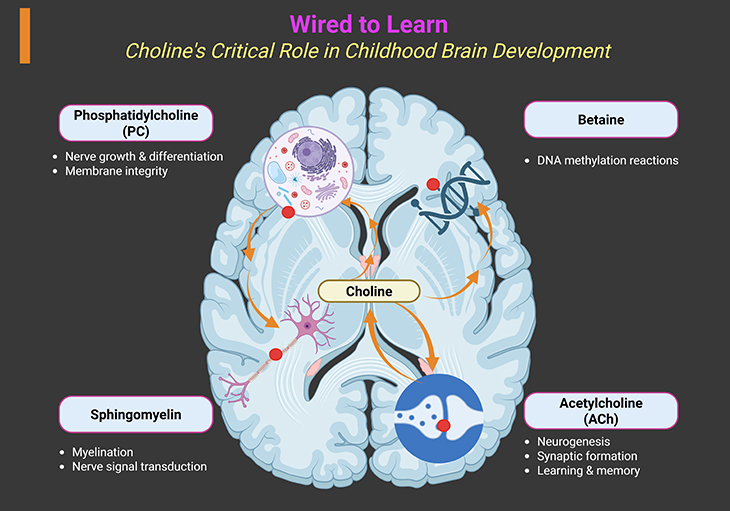
Figure 2. Wired to Learn: Choline’s Critical Role in Childhood Brain Development. This figure illustrates the multifaceted role of choline in supporting neural development and cognitive function during childhood. Choline serves as a precursor for several key molecules: (1) Phosphatidylcholine, a major structural lipid in neuronal membranes and the myelin sheath, essential for maintaining membrane fluidity and signal transmission. (2) Sphingomyelin, another membrane component concentrated in myelinated axons, contributing to efficient neural conductivity. (3) Acetylcholine, a neurotransmitter critical for attention, learning, and memory, synthesized directly from choline. (4) Betaine, a methyl donor involved in epigenetic regulation and homocysteine metabolism, with implications for neurodevelopmental resilience. The figure highlights choline’s contribution to myelination, synaptic communication, and neurotransmitter synthesis, emphasizing its importance during gestation and early childhood. These pathways collectively support the development of executive functions, including working memory and attentional control. Subtle relevance to neurodiverse populations is suggested, as choline-dependent mechanisms may intersect with biological processes implicated in autism spectrum disorder and other cognitive profiles.
Wired to Learn: Choline’s Critical Role in Childhood Brain Development
Choline: A Structural and Functional Brain Nutrient
Choline is a vital nutrient that supports brain development and function across the lifespan. Much like lutein, it plays both structural and functional roles in the nervous system. Choline is essential for producing acetylcholine, a neurotransmitter involved in memory and attention, and for forming key components of cell membranes—phosphatidylcholine and sphingomyelin. These molecules are especially important in the myelin sheath, the protective layer that insulates nerve fibers and speeds up neural communication (see Figure 2) [1; 5-6].
When dietary choline is insufficient, levels of circulating phosphatidylcholine decline, and neural processing speed may suffer. In fact, disruptions in cholinergic signaling and membrane integrity have been linked to neurodegenerative diseases such as Alzheimer’s.
Early Development: Choline’s Role in Myelination
Choline’s importance is especially pronounced during early development. Myelination—the process of forming the myelin sheath—begins in late pregnancy, accelerates during the first 2–3 years after birth, and continues into early adulthood. A recent double-blind, randomized controlled trial found that third-trimester maternal choline supplementation (930 mg/day) improved infants’ performance on an attention task through the first 15 months of life. This task has previously been shown to predict information processing speed and IQ in childhood.
Even modest increases in choline intake during pregnancy were associated with lasting cognitive benefits, suggesting that maternal nutrition can shape early brain development in powerful ways.
Choline and Executive Function in Adults
Recent findings from laboratory research suggest that choline’s cognitive benefits extend beyond infancy. In a study of overweight and obese young adults, higher dietary choline intake was linked to more efficient neural processing. This was measured using the P300 waveform—a brain signal associated with attention and decision-making—during a modified Eriksen flanker task. Participants with higher choline intake showed lower peak amplitudes, indicating less cognitive effort was needed to resolve conflicting information.
Although this was a cross-sectional study, it adds to the growing evidence that choline supports executive control—the mental skills that help us focus, plan, and adapt—throughout life.
Research Gaps and Future Directions
Most choline research has focused on pregnancy and older adults, which makes sense given its role in myelin formation and the potential impact of abnormal methylation on neurodegeneration. However, there is a clear need for more intervention studies in children and adolescents. It remains uncertain whether meeting daily choline requirements in later childhood provides additional cognitive benefits. Understanding this could help shape dietary recommendations and public health strategies aimed at supporting lifelong brain health.
Hydrate to Elevate: Unlocking Mental Flexibility Through Water
Water: The Overlooked Cognitive Ally
Water makes up 55–75% of the human body, and it is essential for transporting oxygen, nutrients, and waste throughout our tissues. Yet despite its importance, many children around the world are chronically underhydrated. A recent systematic review found that, on average, 60 ± 24% of children failed to meet their country’s recommended water intake guidelines (see Figure 1) [1; 7-8].
In laboratory studies, children’s urine osmolality—a measure of hydration—was surprisingly low even under normal conditions (ad libitum), and nearly identical to levels observed during water restriction (<500 mL of plain water per day). This suggests that many children may already be adapting to chronic suboptimal hydration, which could have implications for their health and cognitive function.
Dehydration and Brain Function
When water intake is restricted, the body experiences hypovolemia, a reduction in blood volume that can impair peripheral blood flow. In animal studies, 24-hour water deprivation disrupted cerebrovascular regulation and led to cognitive deficits. Dehydration also increases plasma osmolality, drawing water out of tissues—including the brain.
Research has shown that dehydration can reduce brain volume, as water is pulled from brain cells into the bloodstream. In adolescents, Kempton et al. demonstrated that ventricular enlargement was proportional to body weight loss following exercise-induced dehydration. Although performance on a Tower of London task remained stable, functional MRI revealed increased blood flow to the frontal lobe during dehydration—suggesting the brain had to work harder to maintain the same level of performance.
Children Are Especially Vulnerable
Children are particularly susceptible to dehydration due to their higher surface-to-mass ratio, which increases water loss. They also rely on caregivers to provide regular access to drinking water. In a recent three-condition crossover study, children who consumed >2,500 mL/day of water showed improved cognitive flexibility and working memory compared to those consuming <500 mL/day. Specifically, working memory cost—the mental effort required to hold and manipulate information—was significantly higher in the low-intake group.
These findings align with previous research showing that adequate hydration supports cognitive function in school-age children. Given that executive functions like working memory and flexibility are closely tied to academic achievement, increasing water intake may be a low-cost, high-impact intervention to support learning and mental performance throughout the school day.
Looking Ahead: Hydration and Cognitive Health
While much of the existing literature has focused on the negative effects of dehydration, there is growing interest in the potential benefits of improved hydration. More intervention studies are needed to explore how increasing water intake in children with habitually low hydration might enhance cognitive outcomes. Understanding these relationships could inform school policies, parental guidance, and public health campaigns aimed at optimizing brain function through simple lifestyle changes.
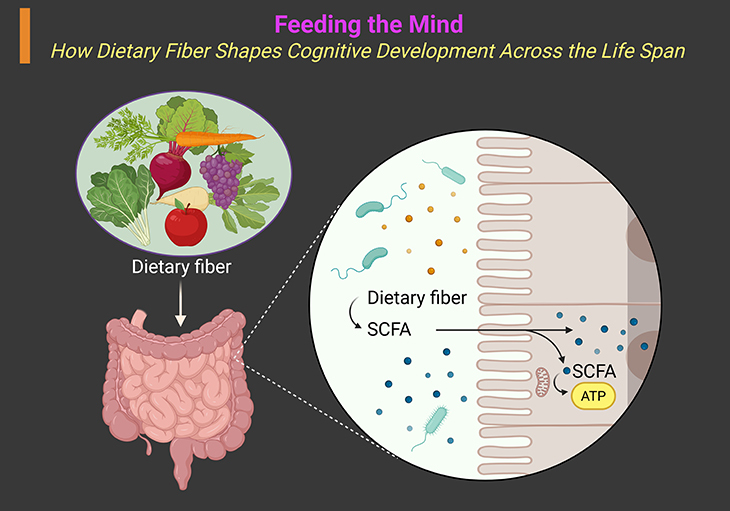
Figure 3. Feeding the Mind: How Dietary Fiber Shapes Cognitive Development Across the Lifespan. This figure illustrates the role of dietary fiber in modulating cognitive development, with emphasis on its impact during childhood. Indigestible carbohydrates—particularly insoluble fiber and pectin—are fermented by gut microbiota to produce short-chain fatty acids (SCFAs) such as butyrate, acetate, and propionate. These metabolites influence brain health through multiple pathways: (1) Butyrate enhances blood-brain barrier integrity, supports epigenetic regulation of neural gene expression, and promotes neurotransmitter synthesis. (2) SCFAs modulate immune signaling, reduce neuroinflammation, and may inhibit absorption of bacterial toxins linked to cognitive decline. (3) In children, higher fiber intake has been associated with improved inhibitory control and attentional regulation, suggesting a functional link between gut microbial activity and executive function. The figure highlights how fiber-driven microbial fermentation contributes to a neuroprotective environment, potentially benefiting children with diverse cognitive profiles—including those with executive function challenges. These findings underscore the importance of habitual fiber intake during early life as a modifiable factor in shaping long-term cognitive trajectories.
Feeding the Mind: How Dietary Fiber Shapes Cognitive Development Across the Lifespan
More Than Digestion: Fiber’s Expansive Role in Health
Dietary fiber is often praised for its digestive benefits, but its influence reaches far beyond the gut. These indigestible carbohydrate polymers—neither digested nor absorbed—have been linked to improvements in blood pressure, cholesterol levels, glycemic control, and insulin sensitivity in both children and adults. Yet one of the most intriguing areas of research is how fiber may affect brain health and cognitive function, particularly through its interaction with the gut microbiota.
When fiber reaches the colon, it becomes fuel for beneficial bacteria. These microbes ferment fiber into compounds like short-chain fatty acids (SCFAs), vitamins, minerals, and even neurotransmitters such as serotonin, GABA, and histamine. These microbial byproducts can be absorbed by the host and influence systems far beyond the gut—including the brain (see Figure 3) [1; 9-10].
The Gut-Brain Axis: A Two-Way Street
The gut-microbiota-brain axis is a complex communication network involving the central, autonomic, and enteric nervous systems, as well as the immune and endocrine systems. Modulating the gut microbiome through dietary fiber may influence cognition via multiple pathways—ranging from vagal nerve stimulation and HPA axis regulation to blood-brain barrier permeability and epigenetic gene expression.
The microbiome itself—defined as the collective genome of gut microbes—has been linked to mental health, body composition, and cognitive performance. Importantly, the composition of these microbial communities is highly sensitive to dietary changes, even in the short term.
Early Life: Seeding the Microbiome
In infancy, the first exposure to dietary fiber comes through human milk oligosaccharides (HMOs)—specialized carbohydrates found in breast milk. Preclinical studies have shown that HMOs can enhance hippocampal function and long-term potentiation in rodents, suggesting a role in memory formation. However, studying the impact of the infant microbiome on cognitive development remains challenging, as microbial communities fluctuate significantly until around 2 years of age, when solid foods are introduced.
Childhood: Fiber and Executive Function
In preadolescent children, higher total fiber intake—measured over a 3-day dietary record—was positively associated with attentional inhibition, a key component of executive control. Specifically, insoluble fiber and pectin, which are readily fermented by gut bacteria, were linked to better performance on tasks requiring inhibitory control. These findings suggest that fiber may help regulate cognitive processes during a critical developmental window (see Figure 3).
However, this study was cross-sectional and did not directly assess the microbiome, leaving open questions about the mechanisms involved. Future research should explore how fiber-driven changes in gut bacteria might influence cognition in children.
Later Life: Fiber and Neuroprotection
As we age, the diversity of gut microbes tends to decline, and individual variability increases. While intervention studies on fiber supplementation in older adults have yielded mixed results, some have reported improvements in mood, memory, and executive function. Observational studies have found that cognitive performance in elderly individuals correlates with microbial composition—negatively with Enterobacteriaceae and positively with Lactobacillales.
In patients with Alzheimer’s disease, recent findings suggest a microbiome dominated by gram-negative bacteria, which may contribute to neuroinflammation and cognitive decline.
Mechanisms: Butyrate and Brain Health
Among the many microbial metabolites, butyrate—a short-chain fatty acid—is particularly important. It plays a direct role in:
- Maintaining blood-brain barrier integrity
- Modulating gene transcription via epigenetic mechanisms
- Promoting neurotransmitter and hormone synthesis
- Inhibiting absorption of bacterial toxins
These effects can reduce neuroinflammation, apoptosis, and amyloid deposition, all of which are implicated in neurodegenerative diseases. A fiber-rich diet may encourage butyrate production, fostering a protective microbial environment that supports brain health.
A Dynamic Ecosystem: Diet and Microbiota
The gut microbiota is highly dynamic, influenced by diet, illness, infection, and medications. While we are still in the early stages of understanding the exact mechanisms, research into butyrate’s role in neuroprotection is promising. There is growing evidence that the gut-brain axis operates across the lifespan—from shaping immune and metabolic pathways in infancy to preserving cognitive function in old age.
Final Reflections: Nutrition as a Cognitive Catalyst
Childhood is a formative period for establishing habits that shape lifelong health. Nutrients like carotenoids, choline, water, and dietary fiber may play pivotal roles in supporting neural development, executive control, and cognitive resilience. Yet despite their potential, the scientific literature faces several limitations:
- Few randomized controlled trials
- Wide variability in cognitive assessments
- Limited understanding of underlying mechanisms
To move forward, researchers must build a robust evidence base linking specific nutrients and dietary patterns to cognitive outcomes in children. This is especially urgent given that nutritional guidelines for cognitive health in children are currently absent from U.S. dietary recommendations [1].
Take-Home Messages
Nutritional Foundations for Childhood Executive Control
Lutein: A Pigment with Purpose
- Lutein accumulates in key brain regions like the prefrontal cortex and hippocampus, suggesting a specialized role in cognitive development.
- Human breast milk delivers lutein with superior bioavailability, supporting early neural deposition and visual function.
- Macular Pigment Optical Density (MPOD) serves as a noninvasive marker of brain lutein status and correlates with academic performance and executive control in children.
- Supplementation studies in adults and emerging pediatric data suggest lutein may enhance attention, memory, and cognitive flexibility—warranting further trials in children.
Choline: Architect of Neural Communication
- Choline is essential for synthesizing acetylcholine and building phosphatidylcholine, a key lipid in the myelin sheath.
- Maternal choline supplementation during the third trimester (930 mg/day) improves infant attention and may predict later IQ.
- In young adults, higher dietary choline is linked to more efficient neural processing, as measured by reduced P300 amplitude during cognitive tasks.
- Despite its known roles in neurodevelopment and neuroprotection, choline’s impact during childhood and adolescence remains underexplored—calling for targeted intervention studies.
Water: The Silent Cognitive Ally
- Despite its fundamental role in nutrient transport, brain volume maintenance, and cerebrovascular regulation, many children remain chronically underhydrated.
- Studies show that 60 ± 24% of children fail to meet national water intake guidelines, with physiological signs of adaptation to low hydration.
- Dehydration increases plasma osmolality, reduces brain volume, and elevates frontal lobe blood flow, indicating greater effort to maintain cognitive performance.
- A hydration intervention revealed that children consuming >2,500 mL/day showed improved working memory and cognitive flexibility compared to those consuming <500 mL/day —highlighting water as a low-cost tool for enhancing school-day cognition.
Dietary Fiber: Feeding the Gut, Fueling the Brain
- Fiber fermentation by gut microbes produces short-chain fatty acids (SCFAs) like butyrate, which influence blood-brain barrier integrity, gene expression, and neurotransmitter synthesis.
- In children, higher intake of insoluble fiber and pectin correlates with better performance on tasks requiring inhibitory control.
- The gut-brain axis—involving neural, immune, and endocrine pathways—is shaped by diet and may impact cognition from infancy through old age.
- While mechanisms remain under investigation, fiber-rich diets may reduce neuroinflammation, delay neurodegeneration, and support executive function across the lifespan.
Together, these nutrients—lutein, choline, water, and dietary fiber—form a constellation of dietary factors that may shape the architecture and efficiency of executive control in children. While the evidence is promising, gaps remain: randomized trials are limited, mechanistic pathways are still being mapped, and cognitive assessments vary widely. Building a robust evidence base is essential—not only to guide future research, but to inform nutritional recommendations that support cognitive health in childhood, a domain currently absent from U.S. dietary guidelines.
Summary and Conclusions
Executive control—encompassing working memory, inhibitory control, and cognitive flexibility—is a cornerstone of cognitive development and lifelong mental health. This article has explored how specific dietary components—lutein, choline, water, and dietary fiber—may influence the maturation and efficiency of executive function in children. These nutrients, though often overlooked in cognitive research, are biologically active in neural development, neurotransmission, and systemic regulation, offering promising avenues for nutritional intervention.
Lutein, a non-provitamin A carotenoid, accumulates disproportionately in the infant brain, particularly in regions critical for executive processing such as the prefrontal cortex and hippocampus. Its antioxidant properties and role in retinal protection are well-established, and emerging evidence links macular pigment optical density (MPOD) to academic performance and attentional control in children. Choline, essential for acetylcholine synthesis and membrane integrity, supports myelination and neural signaling. Maternal supplementation during late gestation has been shown to enhance infant attention and processing speed, while adult studies suggest choline may improve neural efficiency during cognitively demanding tasks.
Water, though often considered a passive nutrient, plays an active role in maintaining cerebral blood flow, brain volume, and metabolic homeostasis. Chronic underhydration in children is widespread and may impair working memory and cognitive flexibility—functions essential for academic success. Dietary fiber, through its modulation of the gut microbiota, contributes to the production of short-chain fatty acids like butyrate, which influence blood-brain barrier integrity, epigenetic regulation, and neuroinflammation. Fiber intake has been positively associated with inhibitory control in children, and microbial composition has been linked to cognitive performance in both pediatric and geriatric populations.
Despite these promising findings, several critical gaps remain. First, the literature is dominated by cross-sectional studies, limiting causal inference. Second, there is a lack of standardization in cognitive assessments, making it difficult to compare outcomes across studies. Third, the mechanistic pathways—particularly those involving the gut-brain axis, epigenetic modulation, and neuroimmune signaling—are still poorly understood. Moreover, intervention trials in children are scarce, and nutritional recommendations for cognitive health are notably absent from national dietary guidelines.
Future research must prioritize longitudinal and randomized controlled trials that examine the impact of specific nutrients and dietary patterns on executive function across developmental stages. Integrating multi-omics approaches—including metabolomics, microbiomics, and neuroimaging—will be essential to unravel the complex interactions between diet, brain, and behavior. Special attention should also be given to neurodiverse populations, such as children with autism spectrum disorder, who may benefit from targeted nutritional strategies that support executive functioning.
In conclusion, nutrition is not merely a matter of physical growth—it is a cognitive investment. By recognizing and harnessing the neurodevelopmental potential of everyday nutrients, we can move toward a more integrative model of pediatric health—one that empowers clinicians, caregivers, and communities to nourish not just the body, but the mind.
For information on autism monitoring, screening and testing please read our blog.
References
-
- Willis N, Khan NA. Nutrition Effects on Childhood Executive Control. Nestle Nutr Inst Workshop Ser. 2020;95:127-135. doi: 10.1159/000511513. Epub 2020 Nov 9. PMID: 33166986.
https://pubmed.ncbi.nlm.nih.gov/33166986/ - Granado F, Olmedilla B, Blanco I. Nutritional and clinical relevance of lutein in human health. Br J Nutr. 2003 Sep;90(3):487-502. doi: 10.1079/bjn2003927. PMID: 14513828.
https://pubmed.ncbi.nlm.nih.gov/14513828/ - Firozjae AA, Shiran MR, Rashidi M. The neuropharmacological and clinical effects of lutein: a systematic review. Horm Mol Biol Clin Investig. 2024 Oct 23;46(1):27-38. doi: 10.1515/hmbci-2024-0053. PMID: 39436867.
https://pubmed.ncbi.nlm.nih.gov/39436867/ - Li J, Abdel-Aal EM. Dietary Lutein and Cognitive Function in Adults: A Meta-Analysis of Randomized Controlled Trials. Molecules. 2021 Sep 24;26(19):5794. doi: 10.3390/molecules26195794. PMID: 34641336; PMCID: PMC8510423.
https://pubmed.ncbi.nlm.nih.gov/34641336/ - Irvine N, England-Mason G, Field CJ, Dewey D, Aghajafari F. Prenatal Folate and Choline Levels and Brain and Cognitive Development in Children: A Critical Narrative Review. Nutrients. 2022 Jan 15;14(2):364. doi: 10.3390/nu14020364. PMID: 35057545; PMCID: PMC8778665.
https://pubmed.ncbi.nlm.nih.gov/35057545/ - Caudill MA, Strupp BJ, Muscalu L, Nevins JEH, Canfield RL. Maternal choline supplementation during the third trimester of pregnancy improves infant information processing speed: a randomized, double-blind, controlled feeding study. FASEB J. 2018 Apr;32(4):2172-2180. doi: 10.1096/fj.201700692RR. Epub 2018 Jan 5. PMID: 29217669; PMCID: PMC6988845.
https://pubmed.ncbi.nlm.nih.gov/29217669/ - Drozdowska A, Falkenstein M, Jendrusch G, Platen P, Luecke T, Kersting M, Jansen K. Water Consumption during a School Day and Children’s Short-Term Cognitive Performance: The CogniDROP Randomized Intervention Trial. Nutrients. 2020 May 2;12(5):1297. doi: 10.3390/nu12051297. PMID: 32370147; PMCID: PMC7282257.
https://pubmed.ncbi.nlm.nih.gov/32370147/ - Khan NA, Westfall DR, Jones AR, Sinn MA, Bottin JH, Perrier ET, Hillman CH. A 4-d Water Intake Intervention Increases Hydration and Cognitive Flexibility among Preadolescent Children. J Nutr. 2019 Dec 1;149(12):2255-2264. doi: 10.1093/jn/nxz206. PMID: 31504690.
https://pubmed.ncbi.nlm.nih.gov/31504690/ - Fu J, Zheng Y, Gao Y, Xu W. Dietary Fiber Intake and Gut Microbiota in Human Health. Microorganisms. 2022 Dec 18;10(12):2507. doi: 10.3390/microorganisms10122507. PMID: 36557760; PMCID: PMC9787832.
https://pubmed.ncbi.nlm.nih.gov/36557760/ - Berding K, Donovan SM. Diet Can Impact Microbiota Composition in Children With Autism Spectrum Disorder. Front Neurosci. 2018 Jul 31;12:515. doi: 10.3389/fnins.2018.00515. PMID: 30108477; PMCID: PMC6079226.
https://pubmed.ncbi.nlm.nih.gov/30108477/
- Willis N, Khan NA. Nutrition Effects on Childhood Executive Control. Nestle Nutr Inst Workshop Ser. 2020;95:127-135. doi: 10.1159/000511513. Epub 2020 Nov 9. PMID: 33166986.


